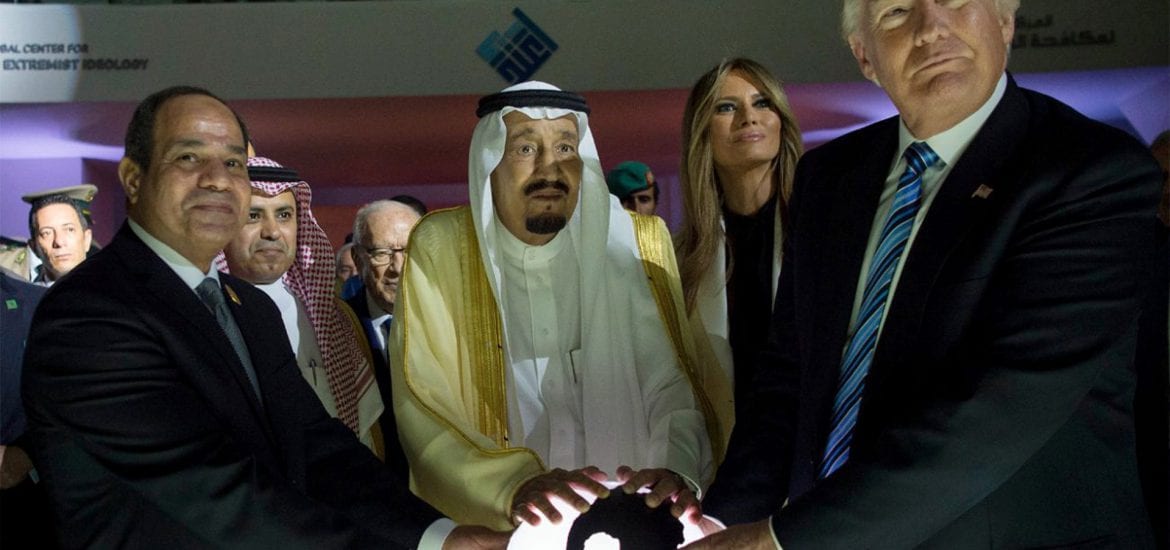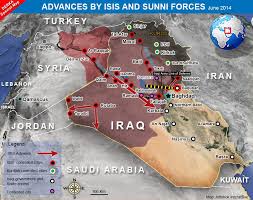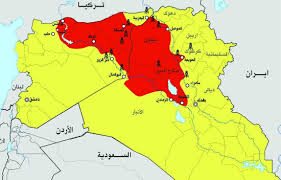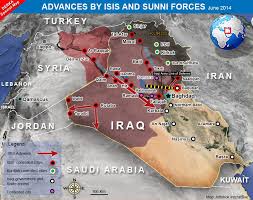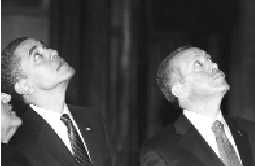By Prof. Muhammad Shamsaddin Megalommatis
Refutation of Prof. Mark Juergensmeyer’s article ‘Is ISIS Islamic?’
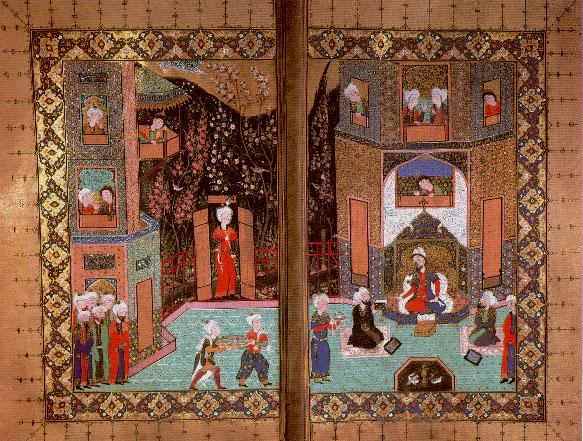
The true Caliphate – this is what the Freemasonic, Zionist gangsters of the West wanted to destroy.
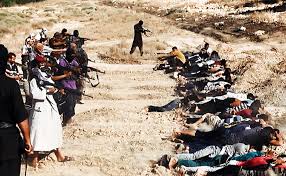
The fake Caliphate – this is what the Freemasonic, Zionist gangsters of the West wanted to bring forth in order to totally eliminate Islam in the process.
In a previous article under title ‘Ottoman Empire, Fake ‘Middle East’, the Pseudo-Christians of the West, and the Forthcoming Tribulation’ , I analyzed why the Western Christians’ stance towards their governments’ policies against the Ottoman Empire and its detached provinces (the technical entities of the so-called ‘Middle East’) is very wrong, definitely immoral, and in total contradiction with the Christian principles, values and virtues. I concluded that a great number of nominal Christians, who approved of the evil policies and deeds of the Western governments, are in reality pseudo-Christians irrespective of what they may think they are.
In a world engulfed in the worst crisis of identity of all times, it is only normal that doubts are raised as regards the identity of the ‘other.’ Only yesterday, Prof. Mark Juergensmeyer, who specializes in ‘global religion’ – a non-existent entity – questioned in an article the identity of ISIS (Is ISIS Islamic? / .
Quite interestingly, under the title, a motto gives the summarizing idea of the article (“Every religion has its dark sides, but the conflict is about politics.”). This is absolutely irrelevant; dark sides in a religion are what you don’t know of that religion. They don’t exist by themselves. No religion has ever had any dark side whatsoever. And all conflicts about politics cannot be deprived of their own religious dimension, because everything in a human society hinges on the spiritual belief or disbelief. Atheists are religious too; they are slaves of Satan either they understand it or not. Their theory and their rejection of God is a form of Satanic faith.
When one starts with so many preconceived ideas as the global religion theoretician Prof. Mark Juergensmeyer, his approach is doomed to fail, but this does not originate from the lack of knowledge of the ‘other side’. And Prof. Mark Juergensmeyer’s main problem is not his lack of insightful knowledge about both, the Islamic world and ISIS itself. The article reveals a serious problem of Christian identity and for this reason I intended to comment on it. I think that my comments will be useful to both, Christians and Muslims.
The author of the article tries to implement the following simplistic logic: if we hold the Ku Klux Klan in the US and the Lord’s Resistance Army in Uganda as ‘Christian’, then we can consider ISIS as ‘Islamic’. This sort of approach does not clarify anything, and rather creates further confusion among both, Christians and Muslims. Generally speaking, I understand and accept the approach through analogy, but to implement this method in your text, you’ve got to select very firm examples. Yes, it is correct to say ‘if we hold the New and the Old Testament as holy books for the Christians, then we can consider the Quran as holy book for Muslims’. Beyond the limit of such comparisons, we can achieve minimal result through analogy and at times lose clarity.
There is always a very serious mistake in every approach that avoids a proper, direct definition and attempts to define something through its opposite. If you want to define Christianity, you cannot possibly be as vague as you are when saying ‘Christianity is something other than / different from Ku Klux Klan’ (or the LRA). Ditto for the Islamic World.
It is really gross to try to define Christianity as the antithesis of what the author calls the LRA ‘a terrible terrorist organization’! Who can expect a religion to possibly be ‘a terrible terrorist organization’? No one!
In addition, there are in Uganda hundreds of thousands if not millions of simple people who, if not terrorized, will have the courage to state that the LRA is NOT a terrorist organization – or if you want not as terrorist as the execrable, racist Ugandan government. And who is authorized to speak about ‘terrorism’? The global mass media? Or the defenders of a non-existent ‘global religion’?
But the term ‘terrorism’ (or ‘terrorist’) is an unhistorical fabrication that was composed only recently as a vicious tool of the world’s most evil, most villainous, and most dictatorial regimes, the likes of America, England and France. It has no credibility, and above all, it is used within political context. Why on Earth a scholar and an academic feels the need to confuse his readers so much as to mention a political term when he talks about religion?
Whatever Christianity has been or has not been or may have been, it is certainly something unrelated to modern political terms; even more so if these terms are recently invented as result of scheming and propaganda and therefore fully rejected by vast populations worldwide.
However, the use of brutal manners in order to achieve power that will later consolidate the survival and the propagation of a faith, a religion, a sect or a secret order-organization is widely attested in almost every religion, culture, nation and period.
There are many historical examples in this regard. The Ismailiyah Order of the Shia Muslims, who were also called Hashashin (because their leader, the famous ‘Elder of the Mountain’ administered the proper dose of hashish to his disciples in order to duly instrumentalize and effectively utilize them for his purposes) and were known to Marco Polo (he called them Assassins and this is how this word was first used in European languages), used to send members (their secret knights) to cross incredibly long distances to arrive where their target (a ruler, an military leader, an imam or other) lived and, by treacherously approaching, assassinate them. Should we call them ‘terrorists’? This would be utterly ridiculous.
It is actually always pathetic and ludicrous to project one period’s / civilization’s / culture’s measures, values and criteria onto other periods, civilizations and cultures. One cannot evaluate others through use of one’s own criteria; every civilization, culture, religion, and historical period is an independent entity that no scholar can transform as per his theoretical needs in any way. The reason for this maxim is simple; by slightly transforming (through improper evaluation involving external criteria) a civilization, culture, religion, and historical period, a scholar only modifies and misinterprets it. This scholar is therefore speaking of a false entity that practically speaking never existed (except in his misinterpretation and imagination); thus, he only confuses his unfortunate readers.
Another example is offered by the Christian Catholic Holy Inquisition. It is undisputed that this Holy Office carried out very brutal policies for long. Should we call it ‘terrorism’? This would also be utterly ludicrous.
As the author is continuously avoiding a proper definition for what is ‘Islamic’ and what is not, the article is characterized by a personal, individualistic approach that is both, irrelevant and confusing. Prof. Mark Juergensmeyer implements again the analogy approach, but this time at the very personal level. He, as a Christian, dissociates himself from the Ugandan LRA and the American Ku Klux Klan, and he therefore postulates that, accordingly, ‘this is the same position most Muslims are in now with regard to ISIS’.
This is very irrelevant because scholars are expected to include personal views and experience in their memoirs at the end of the their lives and not as supposedly convincing evidence in their articles and other publications. This style is very arrogant; in addition, it is very confusing because personal approaches do not constitute proper definitions. The sentence he makes is quiet evident: ‘As a Christian, I feel like they have nothing to do wit h me or with the Christianity that I know’. The last words reveal the extent of the problem; probably the globalist professor and specialist of the non existent ‘global’ religion ( !! ? !! ) does not know the Holy Inquisition, and consequently we can safely claim that he does not know Christianity well. And this is the problem for him and for all the misled and confused Christians of the West.
Many people have been driven to the impasse of assuming a lot; one of their wrong assumptions is to take today’s fallen Christianity as the true Christianity. Similarly, in the Islamic world, there are many Muslims, who assume that today’s fallen Islam is the true Islam. Both groups fail to understand one another because they primarily fail to understand themselves and accurately specify how far they have gone from their respective religions, sailing adrift in the Sea of Relativism and Faithlessness.
After the preliminary part of the article, its inconsistency turns it to a mere worthless piece. As the title obliges the author to give a definition of ISIS, the ‘global religion’ specialist or rather propagandist Mark Juergensmeyer enters into a series of mistakes while giving to his readers unexplained terms that are absolutely meaningless to the non-specialist.
He says: ‘What makes things even more complicated is that ISIS bases its beliefs and actions on a form of Islamic interpretation called Salafism’.
– Why on Earth is now the Salafist nature of ISIS (which is true and beyond any doubt) a problem?
Let me make my position clear. In many articles, I denounced the Wahhabism (the correct term for Salafism) as a deformation of Islam. But Wahhabism (or if you want Salafism) is nothing new to the Western world’s academia and diplomats.
To paraphrase Prof. Juergensmeyer, before any other institution on Earth, Saudi Arabia – the country that America catastrophically chose as its primary ally in the region before …. 70 years or, to put it otherwise, the country that England disastrously conspired with against the Ottoman Caliphate for more than 100 years before the fall of the Ottoman dynasty and continually ever since – ‘bases its beliefs and actions on a form of Islamic interpretation called Salafism’.
What is Prof. Juergensmeyer talking about?
If Saudi Arabia did not exist, there would never be an ISIS.
What does Prof. Juergensmeyer want?
Does he want ISIS to disappear and Saudi Arabia to survive?
That’s silly.
Because if Saudi Arabia continues existing, even if ISIS is mercilessly exterminated and all its members and fighters executed ( and this needs at least 50000 US soldiers in a large scale land attack and in coordination with the venerable president of Syria! ), there will be another ISIS, an ISIS bis if you want, or an ISES (Islamic State of Egypt and Sudan), an ISYA (Islamic State of Yemen and Arabia), or any combination of letters you may choose!
As long as Saudi Arabia exists, Wahhabism will be its pseudo-Islamic state dogma, and through the filthy money of the inhuman gangsters who rule from Riyadh, Wahhabism will be diffused among the masses of Muslims from Morocco to Indonesia to the Muslim Diaspora worldwide.
What is even worse is that Prof. Juergensmeyer fails again to either give a definition of Wahhabism (Salafism) or the historical perspective thereof; as a matter of fact, all the filthy and un-Islamic, dark and inhuman ideas that Muhammad Abdel Wahhab (the founder of Wahhabism) shaped and propagated during the 18th c. did not fall from the sky into his idiotic and ignorant mind. There has been an entire historical process within Islam (with heretic theologians preceding Muhammad Abdel Wahhab by 450 and 900 years) that led to this monstrous theological deformation of Islam. All this is unknown to the ‘global religion’ professor who writes about Islam without having a clue of all academic fields pertaining to the study of this historical – spiritual phenomenon.
This is the historical reality, which is quite well known to specialists of Islamic History and Religion in the West, but it remains concealed, because it is politically disturbing and troublesome. If Wahhabism is not uprooted, if all the Wahhabi institutions across the world are not shut down, if a new class of Muslim intellectuals at the antipodes of Wahhabism is not formed, the explosive situation will only turn worse.
First point of conclusion is therefore that Saudi Arabia and the Saudi family itself must be denounced as the only matrix of all evil across the Islamic world for the last 200 years, and an overwhelming attack against it must be undertaken in order to totally eliminate Riyadh and the villainous, heretic elite which from there managed to incessantly spread the evilness of Wahhabism worldwide.
The confusing presentation of Prof. Juergensmeyer is due to the fact that he does not seek the historical, religious, cultural and theological truth, but only writes in order to serve political purposes and needs, preserve strategic alliances, and in the process, effectuate compromises. We saw these compromises in Mosul, in Sanjar and in Raqqah. These compromises are responsible for the evacuation of most of the Yazidis from their homelands; these compromises are the reason for the deracination of all the Aramaean Christians of Mosul; these compromises are the root cause of the hecatomb that the bloodthirsty vampires of ISIS want to deliver.
For one more time, the ‘global religion’ specialist, Prof. Juergensmeyer, attempts a confusing definition through analogy! He writes: “The Salafi movement is similar to an extreme fundamentalism in Christianity”. This is an understatement; in addition, who can specify what ‘fundamentalism in Christianity’ means? This is not called ‘definition’ but ‘anyone’s guess’…
It must however become crystal clear to Western readership that ISIS, Saudi Arabia, and Wahhabism, (Salafism) do not constitute any form of Islamic fundamentalism. They are heretic, so they cannot be held as Islamic in any sense. They are far and out of the foundations of Islam, so they cannot possibly be ‘fundamental’. Muhammad Abdel Wahhab in his days was considered as a heretic and a traitor by the Ottoman administration; the same evaluation concerned also the Ottoman Caliphate’s traitor and founder of the Satanic house of the Saudis.
The two earlier Islamic theologians on whom Abdel Wahhab was based to produce his pseudo-Islamic trash, namely Ahmed ibn Taimiyah and Ahmed ibn Hanbal who lived in the 13th-14th c. and the 8th-9th c, respectively, were also considered as heretic in their times and duly imprisoned. They may be unknown to Prof. Juergensmeyer, but he should then abstain from writing purposelessly on issues he is not relevant of.
The famous, 14th c. Moroccan traveler, explorer and scholar Ibn Battuta encountered in Damascus people who knew personally the evil, villainous and ignorant heretic Ibn Taimiyah who was then imprisoned. This is what the Islamic World’s most illustrious traveler wrote about the progenitor of Wahhabism:
A controversial theologian
One of the principal Hanbalite doctors at Damascus was Taqi ad-Din Ibn Taymiya, a man of great ability and wide learning, but with some kink in his brain. The people of Damascus idolized him. He used to preach to them from the pulpit, and one day he made some statement that the other theologians disapproved; they carried the case to the sultan and in consequence Ibn Taymiya was imprisoned for some years. While he was in prison he wrote a commentary on the Koran, which he called ” The Ocean,” in about forty volumes. Later on his mother presented herself before the sultan and interceded for him, so he was set at liberty, until he did the same thing again. I was in Damascus at the time and attended the service which he was conducting one Friday, as he was addressing and admonishing the people from the pulpit. In the midst of his discourse he said “Verily God descends to the sky over our world [from Heaven] in the same bodily fashion that I make this descent,” and stepped down one step of the pulpit. A Malikite doctor present contradicted him and objected to his statement, but the common people rose up against this doctor and beat him with their hands and their shoes so severely that his turban fell off and disclosed a silken skull-cap on his head. Inveighing against him for wearing this, they haled him before the qadi of the Hanbalites, who ordered him to be imprisoned and afterwards had him beaten. The other doctors objected to this treatment and carried the matter before the principal amir, who wrote to the sultan about the matter and at the same time drew up a legal attestation against Ibn Taymiya for various heretical pronouncements. This deed was sent on to the sultan, who gave orders that Ibn Taymiya should be imprisoned in the citadel, and there he remained until his death.
At a certain point in his article, Prof. Juergensmeyer makes a totally misleading statement (“So, yes, ISIS is ultimately Islamic – whether you like it or not”), which can have disastrous consequences on anyone who may happen to accept it. A heretic cannot be identified with the religion from which he was rejected. It is not a mere point of accuracy, but a critical issue of false target.
Failing to understand this, he adds perjury to infamy, by completing his sentence with the following: “but it is certainly not the kind of Islam that most Muslims would accept or profess”.
This is a pure lie. And more than a merely false point, it reflects the tendencies of the Western governments to totally conceal the truth from their peoples. First of all, no one has accurate estimates on the subject. Gallup polls in several Muslim countries are prohibited – particularly on a subject this critical -, whereas in the rest no Gallup polls have ever been conducted on issues as troublesome as that.
However, there are many indicators that ISIS does truly reflect in a certain way the kind of false, heretic and decayed Islam that most Muslims accept and profess. If you make a list of what is correct as an act or practice of the Islamic way of both, personal life and social organization, including perhaps 500 detailed points accepted by the followers, the fighters and the leaders of ISIS, and then you submit this list to 1000 average Saudis (without adding that these points are all approved by ISIS members), their responses, homogeneous and ominous, will take you by surprise. Their agreement with the 500 points of the list will deliver a result far above 90-95%. Similar results, always above 80%, you will collect from countries like Indonesia, Bangladesh, Pakistan, Yemen, Sudan, Egypt, Algeria, etc. And certainly the agreement will be lower in other countries, but even in Turkey, it will be as high as 40% due to the vicious Western policies in favor of the AKP party Islamists and against the nationalist military establishment of Ankara (a paranoid policy that allowed the ruling Islamists to widen their basis through a varied set of methods).
How can one be sure of this?
By simply walking in the streets of districts inhabited by middle and lower classes (that total more than 80-90% of the total population of the country in most of the aforementioned cases) and observing what goes around, talking to the people, asking about their ideas, and entertaining comprehensive discussions as to just how they see and how they want to see their lives and their social environment – something that Prof. Juergensmeyer did not do, ultimately preferring the calmness and the security of his office somewhere in the States.
However, the situation is far worse than that. If you now present the same list (of what is correct as an act or practice of the Islamic way of personal life and social organization, including perhaps 500 detailed points accepted by the followers, the fighters and the leaders of ISIS) to a selected group of academics, engineers, businessmen, administrators and high profile functionaries, deputies of ‘parliament’ (this is a non-representative assembly for most of the cases), military, ministers and religious authorities across the Islamic world (without however saying that these points are all approved by ISIS members), you will collect even more surprising results. The outright majority of the elite of these countries (and I don’t mean here only Saudi Arabia but all the aforementioned countries) in majority supports the same points. This is for instance the reason one should view the latest president El Sisi of Egypt as theologically – ideologically – politically far closer to the former president Morsy than to the one time vice president El Baradei.
It would take too long to narrate how this situation has been formed, but I would however like to briefly hint at what I said earlier about the theologians who served as source of inspiration for Muhammad Abdel Wahhab, the founder of the Wahhabism (Salafism), namely the heretics Ibn Taimiyah and Ibn Hanbal. In fact, if Muhammad Abdel Wahhab developed the theological system that constitutes today’s Wahhabists’ doctrine, this is due to the fact that Ibn Hanbal’s and Ibn Taimiyah’s successive and intertwined theological systems gradually prevailed among the Islamic world and eliminated or transformed/altered all the opposite systems.
As a matter of fact, if one Muslim imam, qadi, mufti, minister, general, professor, president or businessman today rejects Wahhabism, he still accepts Ibn Taimiyah’s widespread and fully accepted theological system, which is – metaphorically speaking – the tree that produced the fruit of Wahhabism. There is, practically speaking, little difference or no difference at all between the two systems; simply every posterior system that emanates from an anterior is expected to feature and does actually feature some extra points.
The real difference existed in the past, in Islam’s Golden Era, when totally opposite philosophical systems totally prevailed across the highly educated Islamic World. These are the philosophical systems of Ibn Sina, Qurtubi, Ibn Rushd, Ghazali, Mohyieldin Ibn Arabi, Ibn Hazm, to name but a few; to them is due the Islamic Enlightenment, whereas to the gross, villain, uneducated trash of Ibn Taimiyah is due the complete disfigurement of Islam’s quintessence. However, due to the gradual diffusion of Ibn Taimiyah’s theological nonsense and ignominious darkness, and following its prevalence among ignorant and uneducated masses that it created in a vicious circle mechanism, as it attacked Science, Knowledge, Philosophy, Art and Spirituality, gradually all the philosophical systems of the aforementioned Titans of the Islamic Thought disappeared until the end of the 16th c.
Of course, there is one more difference between the political elites of Saudi Arabia, Egypt, Pakistan, etc. and the ISIS extremists; the former, although accepting most of Abdel Wahhab’s theories and all of Ibn Tamiyah’s ideas, differ politically and make the necessary compromises to ensure the survival of their regime. Contrarily, the latter reject the compromise of the former, viewing it as a treason of Islam. Political difference is therefore due to mere survival tactics of elites that are theological quasi-identical to ISIS; these elites believe that by making compromises upon compromises with the West, they can prolong their tenure and the ensuing material benefits. But their existence only spearheads new waves of uncompromising Wahhabists. Certainly, there is also an attitudinal difference (but no behavioral difference) between the followers of a guy like al Bashir of Sudan or Ali Abdullah Saleh of Yemen and the fighters of ISIS; the former want to pocket more money and store it in their banks, whereas the latter are ready to die. But none of them would accept his wife to be uncovered (without hejab, the Islamic veil) or his daughter to travel alone on motorbike across Europe.
The best corroboration of the aforementioned is the following tragicomical contrast between Egypt’s last and current presidents; Muhammad Morsy is viewed by some as extremist whereas the incumbent is considered as a moderate and pragmatist person.
Former Egyptian president Muhammad Morsy’s wife wears hejab (Islamic veil that allows the face to be seen).
Current Egyptian president El Sisi’s wife used to wear a niqab (Islamic veil that covers the face entirely leaving only two small holes for the eyes) and only recently “swapped the niqab for a trendy hijab, hushing up claims that she was dyed-in-the-wool” !!
Prof. Juergensmeyer goes on saying that the reason for which “world leaders are trying to make in saying that ISIS is ‘not Islamic’.” is that ISIS “is certainly not the kind of Islam that most Muslims would accept or profess”. In the light of the aforementioned this appears to be a very unfortunate consideration and an erroneous evaluation of what is going on in the Islamic world.
Reaching the end of the brief yet mistaken article, Prof. Juergensmeyer says that Islam’s name means “peace” which is very wrong (in reality, it means ‘submission to God’ although it originates from the word ‘peace’).
In the article’s last three paragraphs, Prof. Juergensmeyer makes one more futile effort to dissociate ISIS from today’s prevalent Islamic theological systems and to associate it with politics. This is quite pointless and misplaced. In fact, there is no, and there cannot be any, difference between religion and politics in Islam. So, everything that is religious is also political, and vice versa.
Contrarily to the wrong Western assumption that Islam is the only system whereby religion and politics constitute an indivisible entity of faith and action, it is historically proven that all the major religions were systems in which faith and government were perfectly well interwoven. The same occurred particularly in Christianity either Orthodox or Catholic; one may even ponder that in some cases the phenomenon occurred more emphatically in Christianity than in Islam; extensively discussed terms, such as Papocaesarism and Caesaropapism are quite telling in this regard.
So, Prof. Juergensmeyer’s sentence “Besides religion, it is critical to recognize that all the forms of terrorism that we have seen are about politics. Any act of violence in the public sphere is aimed at trying to claim political space – at taking over power to assume control over regions or peoples. This is certainly true in the case of ISIS” is absolutely irrelevant and completely wrong.
The way one family lives is defined by religion; the way one society is organized is specified by religion; the way the art of rule is exercised is decreed by religion. The aforementioned does not only apply to the Islamic world; it does also to Ancient Egypt, Assyria, Babylonia, Iran, etc. It is also valid in Confucian China, Biblical Israel, and Christian Rome or Constantinople. One can enter into details that can fill volumes: the way one fights in battle is determined by religious orders; the way one sleeps is elucidated by religious advice; the way one eats is clarified by religious guidance; the way one has sex is stipulated by religious prescriptions, and so on.
Piety is one of the religious traits and virtues that must be reflected in a person’s life, either this person is Muslim, Christian, Buddhist, Hindu or Confucian. I fully agree with Prof. Juergensmeyer that “most people directly involved in ISIS are not pious Muslims”; this is right. But does it really matter?
And what about Prof. Juergensmeyer? Will he agree with me saying that “most people directly involved in Assets Management are not pious Christians”?
When we see vulture-funds in Latin America terrorizing nations like Argentina (which involves populations far larger than Iraq or Syria) and endangering the lives and the well-being of dozens of millions of people, do we still need to focus exclusively on a minor terrorist group and forget worse gangsters and terrorists who are far more perilous than the idiotic fighters of ISIS?
And this concludes the case of this type of confusing presentations and futile approaches that leave the Western readership in mysteries; identifying the true reasons of an explosive situation may help greatly solve and diffuse the crisis. But it entails a real inquiry about the original and the altered, the genuine and the transfigured, the authentic and the corrupt. Instead of searching pretexts and excuses, one should seek the truth.
It is not only greatly comical but also highly perilous for the Western leaders to continue on the same track. Why should they bother whether most of today’s Muslims accept or don’t accept the doctrine and the practices of ISIS? The Western leaders themselves constantly disregard the majority of the population back in their countries, and particularly when the majority is ostensibly opposite to calamitous choices that they make (such as the case of the erroneously conceived and catastrophically carried out attack against, and occupation of, Saddam Hussein’s Iraq). Their disregard for the wishes and the opinions of the majority of their countries’ populations is monumental; they cannot be sensitive for other nations when they are insensitive for their own.
The search for the reasons that brought about the present situation cannot be undertaken by Western academia, intellectuals and diplomats without a deep investigation of the developments that took place in their own countries in the first place. Before bothering to know whether ISIS is Islamic or not, they should care to find out whether the so-called Christian nations of the West are really Christian. Drunken of their colonial successes for many centuries, the Western peoples lived with myths and lies that totally disfigured the true dimensions of their own deeds, choices and policies. Modernity is not Christian but Anti-Christian. Globalism is not Divine but Satanic. And the Homosexual Marriages are not the ‘right of the free’ but the evilness of the slaves – of Satan.
Atheist, materialistic, and despiritualized, the Western world turned out to be the Cemetery of the Christian Faith. That’s why the leaders of the Western countries did not give a damn about the persecution, expulsion and extermination of the Aramaean Christians in Mosul. They face now a nominalist and legalist theological system of despiritualized Muslims, who are partly westernized and deeply materialistic, which means filled with extremely contradictory elements able to explode with uncontainable consequences.
The fallacy, inhumanity and monstrosity of either systems is such that one could simply consider them as the two faces of same coin. So corrupt and eroded this coin is that nothing can save it; it will soon be thrown in the Hell that it deserves. And its two faces, in full discord to one another, are triggering now by themselves the downgrading spiral that will bring their end. To survive one has to dissociate him/herself from the onerous coin as much as possible, as soon as possible, and as irreversibly as possible.
